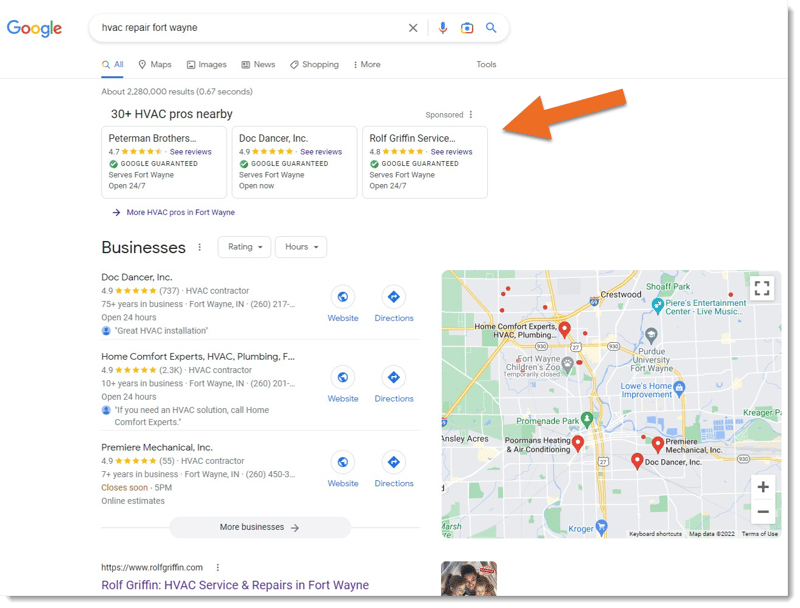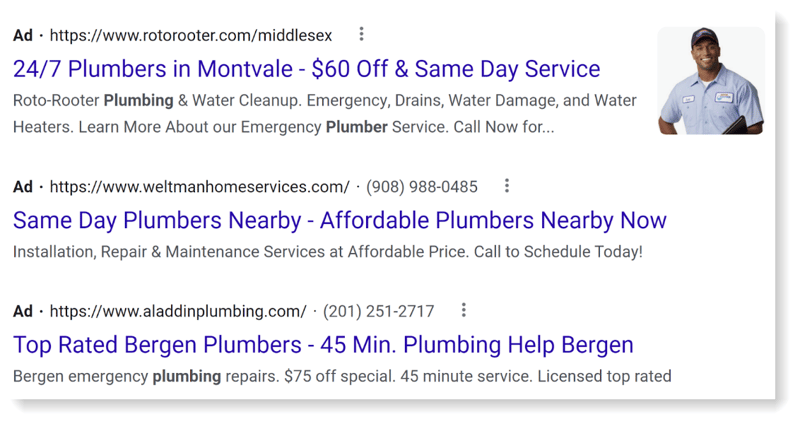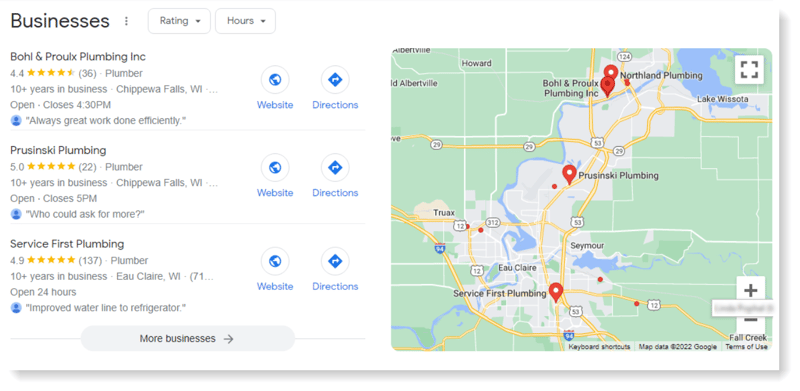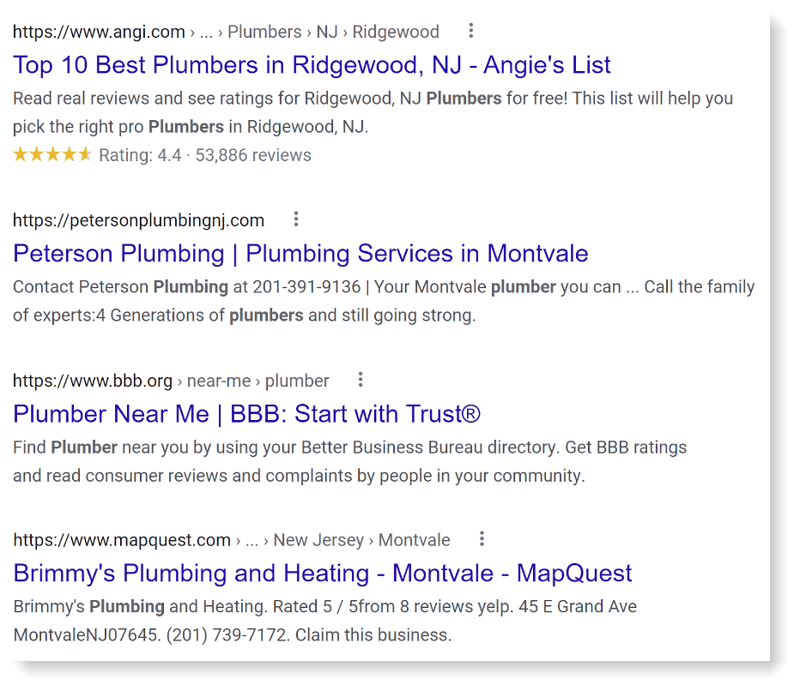4 min read
Go Local, or Go Home! How to Optimize Your Local Pages for Search
![]() Monica Caraway
:
January 30, 2023
Monica Caraway
:
January 30, 2023
.png)
When it comes to showing up high on search results, you may think that large chains with big budgets would have the edge over local businesses.
You'd be wrong!
The truth is that local businesses have the edge when it comes to local search. Why? Because their websites are naturally localized and relevant to the geography they serve. Local companies tend to go more in-depth about what they offer that's relevant to their own regional market.
On the other hand, big brands have to localize each and every one of their local web pages to get attention from Google. Google prioritizes local pages when people are looking for business locations close to them.
Before diving in further, we'd like to thank MarketSnare for their expertise and insight on local search tips covered here (we refer to their guide How Mature is Your SEO Program Across Local Markets).
The 101 on Local Search and Search Engines
Every page of a local business’ website is optimized for the market area they serve. Their content screams “local” to Google and other search engines, capturing their attention and boosting the odds they’ll show up high in Search Engine Results Pages (SERPs).
Google, as you likely know, is pretty clever. Even when searchers don’t enter text like “near me” in their searches, Google’s algorithms understand when someone enters something like “plumber” they’re looking for local plumbers—not plumbers across the country or around the world. So, again, local plumbers have an edge.
Types of Search Results
A good starting point in understanding all this is to learn the different categories of results that Google serves up on searches. When someone searches for “auto repair,” for instance, they will be delivered results that fall into a couple of different categories: Local Service Ads, General Ads, Map Pack, and Organic Search Results.
Local Service Ads
These ads that businesses pay for are used to identify their business as part of a specific category quickly. Advertisers also can become marked as Google Screened or Google Guaranteed, whereby they earn a badge for their business and gain credibility.

General Ads
These are ads that are clearly labeled as “Ads” and are served up ahead of sometimes among organic search results.

Google's Map Pack
The "Map Pack" is a bundle of three local listings that appear next to a map that shows their precise locations.

Organic Search Results
Organic search results are results based on Google's best attempt to identify the “best” results for searchers.

The Power of Organic Local Search
Organic results have power in the minds of consumers because they’re not paid for. Just as paid ads in traditional media are less trusted by consumers than mentions companies might get in the news or through word of mouth, paid ads in search also come with a certain air of suspicion. The company listed, after all, paid to show up.
Organic ads are in top positions because Google has determined they deserve to be.
optimizing for Organic Traffic
When it comes to organic traffic, local traffic is where it’s at for businesses of all sizes. In fact, 78% of consumers use the internet to find information about local companies more than once a week (up from 69% in 2020), and 46% of Google searches are for local information.
In addition, as you likely know through your own experience, consumers have become increasingly wary of paid ads. Click-through rates (CTRs) have taken a nosedive of late. According to LOCALiQ, the average CTR in 2021 was a dismal 3.17%.
Organic Search Costs Less
An added benefit of showing up in organic results? Organic search costs less than paid search. Sure, there's a time investment, or maybe a paid marketing contractor or agency is involved in doing the heavy lifting for you, but you won’t have the added out-of-pocket costs to run paid search ads.
Time, of course, is money, and it does take time to optimize successfully for local search, especially if you’re a business with multiple locations.
What it Takes to Optimize for Local Search
Local businesses often feel that setting up a Google Business Profile (GBP) is all they need to do to position themselves to show up in local search. It’s not. GBPs are just a starting point—an important one, but a starting point, nonetheless.
Keep in mind that your GBP listing may not even show up when someone does a local search!
You need to take additional steps to boost the odds that you will show up high in SERP results and increase your chances of showing up in the Map Pack. Your proximity to the searcher will help you show up in the Map Pack, but there are some other things you’ll need to do, including:
- Optimize for the right keywords
- Ensure that your content is unique and of high quality
- Use pillar pages—pages designed to cover a key topic your business addresses, that then intralinks to supporting pages
- Continually review website analytics and make changes to improve your performance
Multi-location Business vs Local Business
As we’ve seen, local single-location businesses have an edge: their entire website is focused on a single location. Google prefers those for local results. For businesses with more than one location, though, extra effort is required to ensure that:
- Content on every site is optimized for local users
- Content is sufficiently unique to be considered relevant and high quality enough for Google to give you site authority credit and promote your pages
- Content is locally relevant enough that it successfully competes with local competitive businesses
- The volume and frequency of content stand out and help you maintain a high level of authority in Google’s eyes
In addition, even after you’ve taken these steps to optimize your content for local search, you’ll need to stay alert of changes in Google practices and algorithms to ensure that you can keep your authority.
Local search holds a lot of opportunities for local and multi-location business brands and represents some great opportunities for marketers. It’s essential to understand how local search works and the steps to optimize your website to drive organic traffic. The steps covered here are a great starting point! And again, we point you to excellent content on this subject from MarketSnare, "How Mature is Your SEO Program Across Local Markets?
A Guide to Assessing Optimization Efforts for Brands With Multiple Locations." Check it out!
Need More Marketing Help?
Orange Marketing helps established and startup B2B SaaS companies with their marketing and sales efforts. Our customers say it best on how well we can help:
" They audited our HubSpot, created workflows, templates for Sales and Marketing use, CTA's including an extensive eBook, blogs, and trained our entire team (both Marketing & Sales) on HubSpot best practices for success."
They audited our HubSpot, created workflows, templates for Sales and Marketing use, CTA's including an extensive eBook, blogs, and trained our entire team (both Marketing & Sales) on HubSpot best practices for success."
- Karen Sassi
VP Marketing, Eclipse Advantage
 "We work together to set a strategy and let the Orange Marketing team run the execution. The team is very metric-driven and provides us a lot of visibility into what's working...the team from Orange Marketing consistently exceeds our expectations!"
"We work together to set a strategy and let the Orange Marketing team run the execution. The team is very metric-driven and provides us a lot of visibility into what's working...the team from Orange Marketing consistently exceeds our expectations!"
- Thad West
CEO & Co-Founder, IsosTech
" The OM team delved into our data as well as the integration with our CRM…Salesforce. They have the experience and instincts that guided us through all of the pitfalls and helped us through the entire process."
The OM team delved into our data as well as the integration with our CRM…Salesforce. They have the experience and instincts that guided us through all of the pitfalls and helped us through the entire process."
- Patti Wolkstein
Director of Sales and Marketing, eZCom Software Inc.
We cannot wait to help your business!
